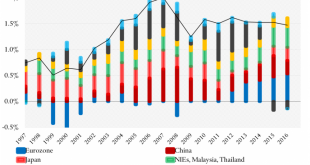SummaryThe US budget deficit is $147 billion in March 2019; this is a net add to private domestic sector income. Dollars added to the economy by the federal government allow the private sector to post a $147 billion surplus and add to its stock of net financial assets. Private credit growth was again flat and added less than $1.8 billion to the money supply. A big drop from the January contribution of over $70B. Further, income flows from the national government impact investment markets...
Read More »Ricardo Martin — Monetary Sovereignty
The main lesson I want to draw from this post is (excluding being autarkic/poor or being in a monetary union): If a country wants to maintain a fixed exchange rate, the country must accumulate a lot of foreign reserves to be sovereign (or maybe some capital controls?) If a country wants to have floating exchange rates, it must convince its trading partners (or its trading partners’ trading partners) to hold its national currency as foreign reserves. losinterestMonetary Sovereignty...
Read More »Heiner Flassbeck — The economic situation in Bulgaria and Romania – Part 2
How little the two Eastern European countries that we have focused on can be compared with Western countries can be seen very clearly in the development of unemployment (Graph 1). Following the major crisis of 2008/2009, the unemployment rate in Romania hardly rose at all. In Bulgaria it increased significantly, but despite weak economic development after 2013 it is falling at an astonishing rate, almost to the relatively low Romanian level.For Romania, this can only mean that unemployment...
Read More »Charles Adams — The single most important piece of economics that everyone should know [sectoral balances]
Sectoral balances may not sound like something you need to know, but if you will give me a moment I will try to convince you. It might change what you do.... Progressive PulseThe single most important piece of economics that everyone should knowCharles Adams | Professor of Physics at the University of Durham, where he teaches Optics and Econophysics
Read More »Alan Longbon — Good News: The CBO Reports The Federal Government Deficit Will Be Larger Than First Thought And Go On For Decades
SummaryContrary to mainstream opinion the CBO report is a positive result. The CBO finds that higher deficits will lead to higher and faster GDP growth and employment. The governement deficit is the private sector surplus and while the private sector balance remains positive and grows the likelihood of a stock market crash or recession is low. The purpose of this report is to show the finding of the latest CBO about the Federal deficit is a good thing and should be celebrated. To produce...
Read More »David Graeber — Accounting error spells chaos for global economy
The title may be alarmist but the post is worth reading. David Graeber points out that the sectoral balances don't actually balance and asks why, since it is an accounting identity. When I first saw this diagram I was startled and confused. Was I missing something? Was there something about the math I didn’t understand? I passed the image on to two different economists and asked just that: isn’t there something wrong with the numbers here? You’ll notice that towards the end of the graph,...
Read More »IMF Provides Cover for Europe’s Dysfunctional Currency Union
The Council on Foreign Relations’ Brad W. Setser has produced a couple of interesting blogposts on Germany’s fiscal policies of late. The first one, titled “Germany Cannot Quit Fiscal Consolidation,” was published at the end of August. On September 18th, the second one appeared, titled “The Global Cost of the Eurozone’s 2012 Fiscal Coordination Failure.” The latter is more limited in scope and draws heavily on a recent report by the Banque de France. Setser elaborates on the rather...
Read More »Peter Cooper — Short & Simple 19 – Sectoral Balances in a Closed, Demand-Determined Economy
We have seen that the ‘income-expenditure model’ combines key macro identities (introduced in parts 7 and 15) with particular behavioral assumptions to provide a theory of income determination (considered in parts 16 and 18). The behavioral assumptions relate to causation. The causation envisaged in the income-expenditure model has implications for the sectoral balances, some of which are the focus of the present post.... heteconomistShort & Simple 19 – Sectoral Balances in a Closed,...
Read More »Trends and prospects for private-sector deleveraging in advanced economies
In-depth analysis on Credit Writedowns Pro. You are here: Economy » Trends and prospects for private-sector deleveraging in advanced economies This post originally appeared on Vox. By Serkan Arslanalp, Reinout De Bock, Matthew Jones Major advanced economies have made mixed progress in repairing the private sector’s balance sheets. This column explores private sector deleveraging trends and calls for a set of policies that will return debt to safer levels. Monetary policies should support...
Read More » Heterodox
Heterodox

